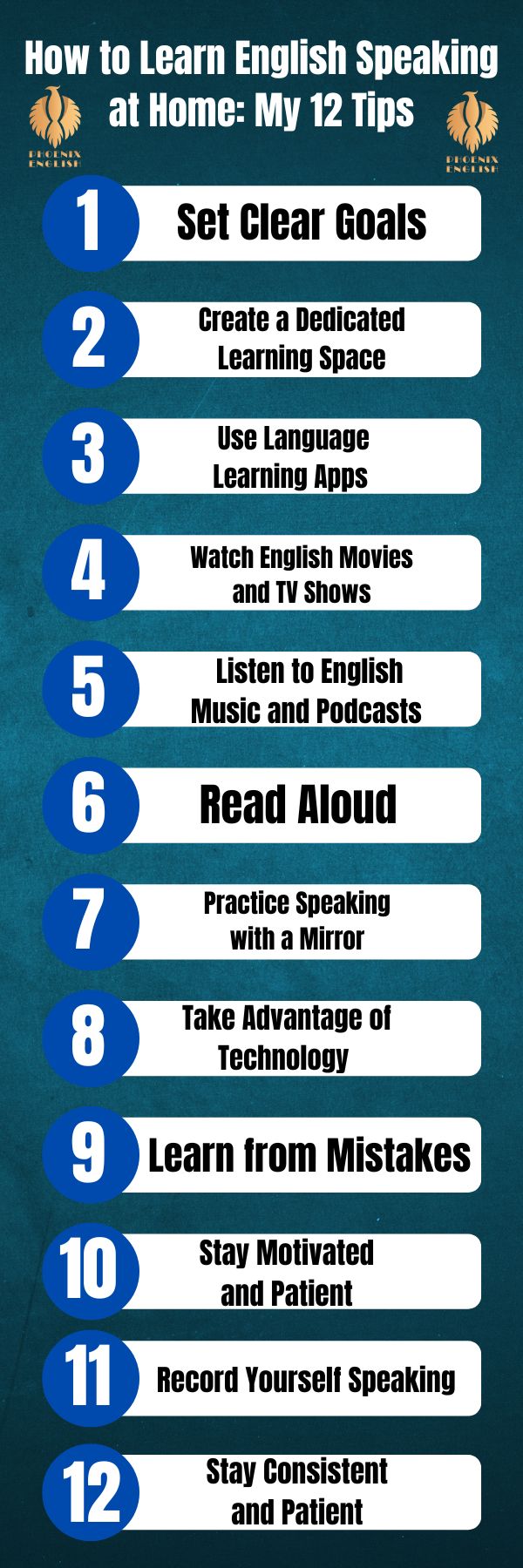Learning to speak English fluently can be a rewarding and enriching experience. Whether you’re a beginner or looking to refine your skills, practicing at home provides a flexible environment to grow your language abilities. Here are my tips to help you improve your English speaking skills from the comfort of your home.

Set Clear Goals
– Define what you want to achieve in your English speaking journey. Whether it’s having a conversation, giving presentations, or passing exams, having clear objectives will help you stay focused and motivated.
Practice Speaking Daily
– Dedicate time each day to practice speaking. Even 10-15 minutes of speaking English aloud can make a significant difference. Choose topics that interest you to keep the practice enjoyable.
Use Language Learning Apps
– Utilize apps like Duolingo, Babbel, or Rosetta Stone for interactive exercises. They often include speaking components that allow you to practice pronunciation and gain feedback.
You might also enjoy:Which of the Following: Definition + Complete Usage + Grammar
Watch English Movies and Series
– Watching movies or TV shows in English can improve your listening skills and expose you to different accents and colloquialisms. Try to repeat phrases and dialogues to practice pronunciation and intonation.
Engage in Online Conversations
– Join language exchange platforms like Tandem or HelloTalk to connect with native speakers or other learners. Engaging in live conversations can boost your confidence and speaking skills.
Read Aloud
– Choose English books, articles, or poetry and read them aloud. This will help improve your vocabulary, pronunciation, and fluency. Recording yourself can also provide insight into areas for improvement.
Keep a Speaking Journal
– Document your thoughts, experiences, or daily activities in English. Try to verbalize your entries, either by speaking them out loud or recording your voice, encouraging you to think in English.
Practice Pronunciation
– Use online resources and tools like Forvo or YouGlish, which allow you to hear how words are pronounced by native speakers. Mimicking these pronunciations will enhance your speaking skills.
Join Online English Classes or Workshops
– Enroll in online courses focused on speaking skills. Websites like Coursera or Udemy offer courses that include speaking practice and professional feedback.
Play Language Games
– Engage in fun activities like word games, tongue twisters, or sentence building games. These can make learning less daunting and help reinforce vocabulary and grammar in an enjoyable way.
Create a Routine
– Establish a regular study routine that includes various activities, such as speaking practice, listening exercises, and reading. Consistency is key to making progress.
Stay Positive and Patient
– Language learning is a gradual process. Celebrate your progress, no matter how small, and remember that making mistakes is a natural part of learning. Keep a positive mindset to stay motivated.
I found tactics that worked effectively for me through trial and error. These are
my top 12 recommendations for learning to speak English at home.
You Might Also Enjoy:Reinforce Vs Reenforce: 10 Differences + Examples [2025]

1. Set Clear Goals
I learned early on in my English studies how important it is to have specific, attainable goals. This was a critical step since it provided me with inspiration and direction. I started by outlining my goals and the reasons behind my desire to learn English.
Having clear goals kept me motivated, whether I was
traveling, working, or just for myself. I divided my objectives into more doable, smaller targets, like learning ten new words a week or practicing public speaking for fifteen minutes every day. These little objectives helped me stay motivated and monitor my development.
You might also enjoy:Where Does “How is your Day Going?” Originate From?
2. Create a Dedicated Learning Space
Making a room at home specifically for studying had a big impact on my language learning process. I set aside a distraction-free, peaceful part of my room where I could concentrate on my studies.
This area had all the supplies needed, such as computers, pens, notebooks, and dictionaries. Having a regular and well-structured study space made it easier for me to form study habits and adopt the proper learning mentality.
3. Use Language Learning Apps

In order for me to learn a language, technology was essential. I looked into several programs for learning languages, including Memrise, Babbel, and Duolingo. Learning was made interesting and enjoyable by the interactive lessons, vocabulary drills, and speaking practice provided by these apps.
My motivation was maintained and constant practice was encouraged by the gamified components and everyday challenges. In addition, I was able to practice speaking and get immediate feedback by connecting with native speakers through applications like Tandem and HelloTalk.
4. Watch English Movies and TV Shows
English-language TV series and films were enjoyable and educational to watch. I choose comedies, dramas, and documentaries, among other intriguing things.
I initially watched using subtitles to help me comprehend the dialogue, but I gradually got more ambitious and stopped using them.
Through this exercise, I was able to become more adept at listening and to understand slang terms and cultural quirks. To improve my speech, I also tried to replicate the performers intonation and pronunciation.
5. Listen to English Music and Podcasts
I developed a daily habit of listening to English-language podcasts and music, which greatly enhanced my speaking and listening abilities. I made playlists with my fave English songs and practiced rhythm and pronunciation by singing along.
Conversely, I was exposed to a wide range of themes, language, and accents through podcasts. I discovered that summarizing what I heard or saying words aloud helped me to listen actively.
Through this practice, I was able to increase my vocabulary and speak more fluently in addition to improving my comprehension.
You might also enjoy:Interested In or On: The Differences + Examples [2025]
6. Read Aloud
One of the best things I ever did to get better at speaking was to read aloud. I began by reading short stories and children’s books before advancing to more difficult readings like essays and novels.
I was able to improve my pronunciation, intonation, and fluency by reading aloud. Additionally, it offered me the courage to talk in front of people. I videotaped myself reading aloud and listened to the replay to see where I needed to improve.
7. Practice Speaking with a Mirror
Speaking in front of a mirror was an easy way to practice speaking and gain confidence. I talked while standing in front of a mirror about a variety of subjects, including my day, my opinions, and a story.
I was able to watch my body language and facial expressions during this practice, which is crucial for effective communication.
It also lessened my worry of making mistakes and helped me feel more at ease speaking in public.
8. Engage in Language Exchange
Speaking with someone in a different language changed my ability to communicate.
I connected with fluent English speakers who were learning my original language by using online language exchange services like Conversation Exchange and My Language Exchange.
We made phone or video conversations on a regular basis so we could practice speaking. Through these contacts, I was able to get constructive criticism and practice in a real-world setting.
Additionally, language exchange opened my eyes to many cultures and communication styles.
9. Join Online Speaking Clubs
Practicing speaking in a controlled and encouraging setting was made possible by joining online speaking groups.
I discovered a number of language learning groups on Facebook and Meetup. These groups planned online get-togethers, debate forums, and public speaking competitions.
I gained confidence, enhanced my conversational abilities, and got practice speaking in front of a group by taking part in these activities. It was a fantastic way to network with other like-minded students and exchange advice and resources.
You might also enjoy:What Kind of Vs What Kinds of – Differences + Examples [2025]
10. Use Speech Recognition Software

Software for speech recognition, such as Siri and Google Assistant, proved to be useful tools for me as I learned. I practiced speaking with these tools and got instant feedback on how accurate and well I was pronouncing words.
I requested Google Assistant to narrate a tale, make reminders, and respond to inquiries, for instance. I was able to talk more confidently and fluently after engaging in this interactive exercise.
Additionally, I improved my speaking abilities by dictating notes or messages using speech-to-text tools.
11. Record Yourself Speaking
Making a speech recording of myself was a thought-provoking practice that helped me keep track of my development. I captured brief talks, debates, or lectures on a range of subjects.
I was able to pinpoint my areas for growth, as well as pronunciation mistakes and fluency gaps, by listening to the recordings.To keep track of my development, I also looked at my recordings throughout time. This exercise in self- evaluation inspired me to keep developing and honing my speaking abilities.
12. Stay Consistent and Patient
The secret to my success in learning English speaking at home was perseverance. I committed to practicing on a daily basis, even if it was only for a few minutes.
I kept reminding myself that language learning is a process that takes time and effort. I celebrate small victories and acknowledge my progress
to stay motivated.
Whenever I felt discouraged, I went back to my objectives and reminded myself of why I started learning English. Ultimately, this optimistic outlook and persistent effort led to notable gains in my speaking abilities.
You might also enjoy:Too Cute Meaning Vs To Cute (To Vs Too) + Examples
Considering My Journey

When I think back on my language learning experience, I see how important these 12 suggestions were in assisting me in reaching my objectives. Every advice had a distinct effect on how I improved various facets of my speaking abilities. Here’s a closer look at how these techniques influenced my education:
Having Specific Objectives
Establishing specific goals early on gave focus and purpose. I was aware of my objectives and could assess my development in relation to them. One of my first objectives, for example, was to have a simple discussion with a native speaker.
This objective became achievable by breaking it down into smaller activities, like memorizing key words and practicing every day. Achieving this milestone boosted
my confidence and motivated me to set more ambitious goals.
Creating a Dedicated Learning
Space I was able to establish a concentrated and effective atmosphere with a dedicated study area.
It turned into a location where I could focus only on learning English. My study habits also reflected this uniformity in my physical environment. Having everything I needed close at hand made studying more productive and pleasurable.
You might also enjoy:How Are You Fairing or Faring? Differences + Examples
Leveraging Technology

The ease of accessing lessons and practice exercises on my phone or computer allowed me to study anytime, anywhere. The immediate feedback from speech recognition tools helped me correct mistakes on the spot, accelerating my learning curve.
Interactive and personalized learning experiences were
provided by language learning apps and speech recognition software.
Engaging with Media
In addition to enhancing my listening abilities, watching English-language films and television series introduced me to a variety of dialects and cultural settings.
I’m now more flexible and self-assured in my ability to recognize and react to different speaking styles as a result of this experience. My study regimen was made more enjoyable and varied by the addition of music and podcasts, which kept me interested and inspired.
Practicing Speaking
Techniques like reading aloud, speaking with a mirror, and recording myself were practical ways to practice speaking. These methods allowed me to focus on specific aspects of speaking, such as pronunciation, intonation, and fluency, in a controlled environment. They also helped me build confidence and reduce anxiety about speaking in front of others.
Seeking Interaction
Speaking groups on the internet and language exchange programs provide priceless possibilities for in- person practice.
My conversational abilities were enhanced and I gained real-world experience utilizing English in a variety of situations thanks to these exchanges with other students and native speakers. My confidence and skill were much enhanced by the criticism and support I received from these communities.
You Might Also Enjoy: Top 60 Most Common Simple Sentences In English
Embracing Consistency and Patience
Consistency and patience were the bedrock of my learning journey. Regular practice, even in small doses, ensured continuous improvement. I learned to be patient with myself and recognize that progress takes time. This mindset helped me stay committed and enjoy the learning process, despite occasional setbacks.
Additional Tips for Effective Learning
While the 12 tips above were foundational to my language learning journey, I also discovered additional
strategies that enhanced my experience:
Use Flashcards for Vocabulary Building
Flashcards were an effective tool for expanding my vocabulary. I created digital flashcards using apps like Anki and Quizlet, which allowed me to review and test myself regularly.
This active recall method helped me retain new words and phrases better. I also categorized flashcards by themes, such as travel,
food, and work, making it easier to use them in relevant contexts.
Practice Mindfulness and Relaxation

Learning a new language can be stressful at times. Practicing mindfulness and relaxation techniques, such as deep breathing and meditation, helped me stay calm and focused.
These practices reduced anxiety, improved concentration, and made my study sessions more productive. I found that a relaxed mind was more receptive to learning and retaining new information.
Engage in Creative Writing
It was enjoyable to try utilizing new grammatical rules and vocabulary via creative writing. I used English to write poetry, short tales, and diary entries, which gave me the freedom to play around with language. Sharing my writing with internet forums or language exchange partners yielded encouraging comments and helpful criticism.
You might also enjoy:Emersion Vs Immersion: Meaning, Differences, and Examples
Explore Language Learning Blogs and Forums
Reading blogs and participating in forums dedicated to language learning offered valuable insights and tips from other learners and experts. Platforms like Reddit’s language learning community and Fluent’s blog provided practical advice, study resources, and motivational stories. Engaging with these
communities kept me informed and inspired.
Set Realistic Expectations
Setting realistic expectations was crucial for maintaining motivation. I acknowledged that fluency wouldn’t come overnight and that it was okay to make mistakes.
This mindset allowed me to celebrate small victories and view challenges as opportunities for growth. I reminded myself that every effort, no matter how small, contributed to my progress.
You might also enjoy:Looking Forward To Seeing You: Grammar + Examples[2025]
Conclusion
For me, developing my English-speaking abilities at home has been a life-changing experience. I was able to make great progress by establishing specific objectives, setting up a dedicated study environment, utilizing technology, interacting with media, honing my speaking skills, looking for engagement, and
accepting constancy and patience.
My learning process was further enhanced by other techniques including making use of flashcards, meditating, writing creatively, reading blogs and forums on language learning, and having reasonable expectations.
Every one of these pointers was really helpful to me in improving both my confidence and speaking abilities. The adaptability and individualized nature of remote learning enabled me to customize my study strategies to fit my requirements and inclinations.
Despite some difficulties along the way, the benefits were well worth the effort. I’m happy with my progress and want to keep becoming better at speaking English.
I urge anyone starting a similar path to look over these suggestions and see what suits them the best.
Stay steadfast, engage in self-compassion, and enjoy the trip. Learning to speak English at home can be a rewarding and powerful experience if you put in the necessary effort and use the appropriate techniques.

Hi, welcome to my blog! My name is Omid and I am thrilled to have you here! I am an English language teacher with 12 years of experience and hold multiple international certifications (TESOL, IELTS, TOEFL, PTE, CELTA). Additionally, I hold a PhD in Applied Linguistics with a specialization in Teaching English as a Second Language (TESL), which fuels my passion for teaching English and assisting others in mastering the language. To me, nothing is more rewarding than helping individuals enhance their English language abilities through various methods. So, let’s embark on this journey of learning English together.




